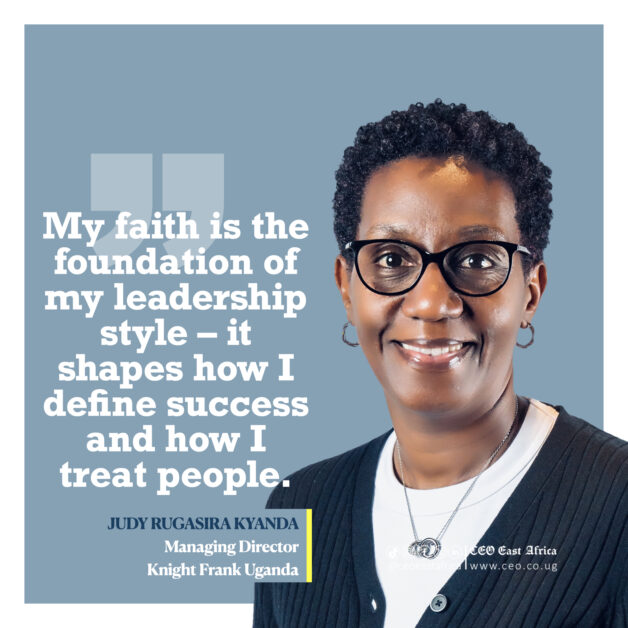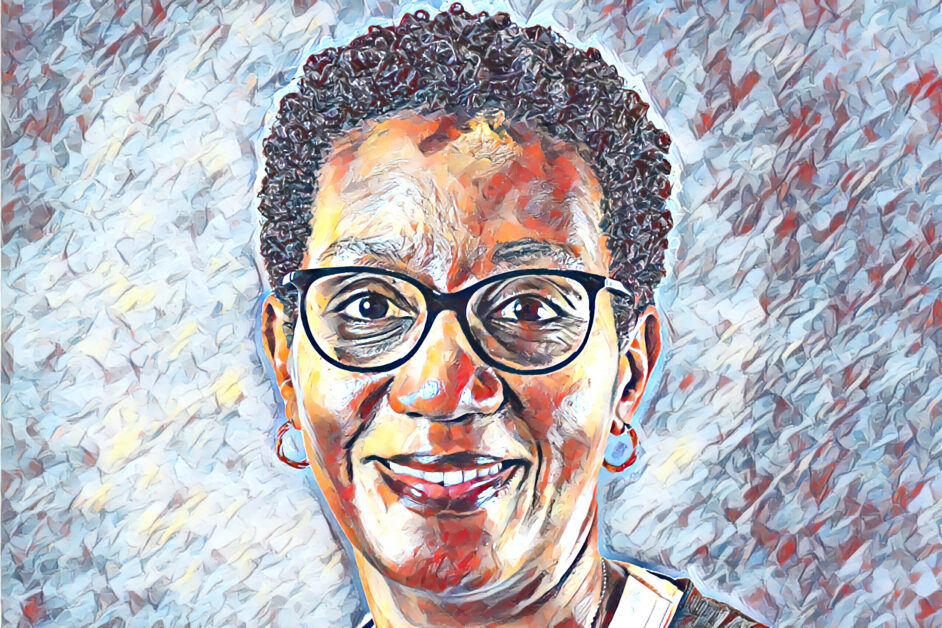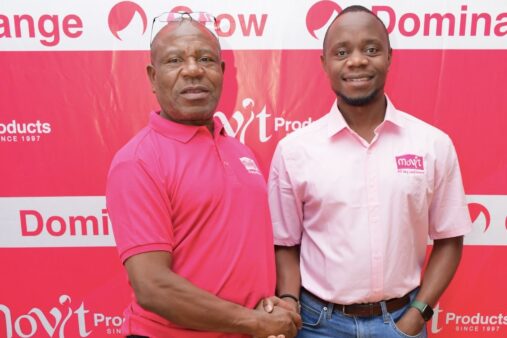Leading with Purpose: Judy Rugasira on Faith, Integrity, and Stewardship
Leading with Purpose: Judy Rugasira on Faith, Integrity, and StewardshipFor Judy Rugasira, leadership is more than strategy—it’s a calling rooted in faith. In this deeply reflective interview, the Managing Director of Knight Frank Uganda reveals how her Christian beliefs shape every facet of her leadership, from daily routines to high-stakes decisions. Drawing from Scripture and lived experience, she explains how values like integrity, service, and stewardship foster not only business excellence but also long-term organisational resilience. With honesty and grace, Judy offers a compelling vision of leadership anchored in purpose and guided by a higher standard.
How has faith influenced your leadership style at Knight Frank Uganda?
My faith is the foundation of my leadership style – it shapes how I define success and how I treat people. At Knight Frank, I strive to lead in a way that reflects core biblical values. This means making decisions guided by integrity, service, stewardship, and purpose every day. For example, faith teaches me that integrity is non-negotiable. “Whoever walks in integrity walks securely,” as Proverbs 10:9 says, and I’ve seen that honest leadership builds trust with our clients and the team. Similarly, Christ’s model of servant leadership inspires me to put others first. Jesus said, “The Son of Man did not come to be served, but to serve” (Mark 10:45), reminding me that true leaders are meant to serve their team and community.
Faith also brings a sense of stewardship – I believe the responsibilities and resources I have are entrusted to me by God, so I handle them with care and accountability. “One who is faithful in a very little is also faithful in much” (Luke 16:10), and I take that to heart in managing projects and mentoring staff. Lastly, my decision-making is purpose-driven: rather than chasing short-term gains, I aim to honour a higher purpose and the long-term good. Colossians 3:23 encourages, “Whatever you do, work heartily, as for the Lord and not for men,” which motivates me to pursue excellence for God’s glory and the good of others. By grounding my leadership in these faith-based values, I’ve found that we not only achieve business goals but also create a culture of trust, compassion, and excellence.
How has faith influenced your leadership style at Knight Frank Uganda?
Yes, absolutely – my day as a leader typically begins and ends with quiet time for spiritual grounding. Each morning, I wake up early to pray and read Scripture. This morning routine is vital for me: it’s a time to seek wisdom and align my heart with God’s will before the hectic workday starts. One of my go-to scriptures is Proverbs 3:5–6, which says “Trust in the Lord with all your heart… in all your ways acknowledge Him, and He will make straight your paths.” This reminds me to rely not just on my own understanding but on God’s guidance in every decision. I often pray over the upcoming meetings and projects, asking God for clarity and discernment. James 1:5 instructs that if we lack wisdom, we should ask God, who gives generously – so I do exactly that, especially when facing tough calls.
Throughout the day, I incorporate moments of reflection. This could be a short prayer before a critical meeting or a few minutes of meditative silence during lunch to recalibrate. These habits keep me centred and prevent stress from overwhelming me. In challenging moments, I fall back on scriptural advice: “Do not be anxious about anything, but in every situation, by prayer and petition… present your requests to God.” In return, “the peace of God… will guard your hearts and minds” (Philippians 4:6–7). Taking that pause to pray often replaces anxiety with a sense of peace and perspective. I also end my day (depending on how the day went) with reflection and prayer. Sometimes I’ll journal or quietly review the day’s events, thanking God for the successes and learning from the failures. This evening practice of gratitude and honesty in prayer helps me stay grounded. By anchoring my daily routine in prayer, meditation on Scripture, and reflection, I find I’m more patient with others, more confident in decisions, and better able to lead with compassion. It’s a practical way I “stay tuned” to my faith, which in turn positively influences how I lead my team and serve our clients.
In your experience, how does integrating faith into leadership contribute to long-term success, personal growth, and organisational resilience?
Integrating faith into leadership has a profound impact on both personal and organisational levels. First, it contributes to long-term success by building a strong ethical foundation. When your leadership is rooted in faith-based values like integrity and honesty, you create an atmosphere of trust. My Colleagues and clients know they can rely on my word. This trust is a priceless asset – it leads to loyalty, repeat business, and a positive reputation that sustains success over the long haul. The Bible teaches that “whoever walks in integrity walks securely”, and I’ve found that doing the right thing, even when it’s hard, prevents many challenges down the road. We avoid the pitfalls that come from cutting corners, and instead, we lay the groundwork for sustainable growth.
Faith-driven leadership also fuels personal growth. It continuously challenges me to develop character traits such as humility, patience, and empathy. Leading a team, especially a high performing team inevitably brings trials and high-pressure situations, but I see these as opportunities to grow in character and faith. Scripture encourages us to “consider it pure joy… whenever you face trials… because the testing of your faith produces perseverance”.
Perseverance, in turn, builds maturity. I have certainly grown through challenges by leaning on faith – whether it was navigating through the Covid pandemic or making a tough ethical choice, each experience stretched my abilities and strengthened my resolve. Integrating faith keeps me mindful that success isn’t just about profit margins; it’s also about becoming a better servant-leader and refining my character in the process. I firmly believe that God is more interested in who I am becoming through the work than just the work itself. That perspective keeps me striving to learn and improve continuously, aligning my personal growth with spiritual growth.
On an organisational level, faith adds a layer of resilience. Businesses go through storms – market fluctuations, unexpected crises, even global events. Leadership grounded in faith inspires a team to stay hopeful and united through difficulties. I often draw on biblical principles of hope and perseverance to encourage my team. For instance, during the challenging times (like the pandemic period), during our virtual fellowships, I reminded our colleagues that trials can strengthen us and that “suffering produces perseverance; perseverance, character; and character, hope” (a principle from Romans 5). By openly communicating hope and demonstrating steady faith through corporate prayer in tough moments, I’ve seen anxiety go down and teamwork go up.

Integrating faith means I’m not just relying on my own strength or the circumstances; I’m also trusting in a bigger plan. That outlook is contagious – it helps the team and organisation adapt and bounce back more robustly. We have corporate lunch hour fellowship every Monday where we pray for guidance as a team and emphasize caring for each other. These spiritual practices help us build solidarity.
As a result, Knight Frank Uganda has become not just a workplace but a community that can weather setbacks together. In Conclusion, faith in leadership acts like a compass and a safety net: it guides me toward ethical, purpose-driven decisions that yield lasting success, and it provides encouragement and stability when I face headwinds. The long-term effect is a culture where people thrive, knowing that their work has meaning and that they will be supported through every high and low.
What would you say to other leaders or aspiring leaders who may be seeking ways to balance their professional responsibilities with their spiritual values?
I would tell them that it’s not only possible to honour your spiritual values in a high-pressure professional world – it’s actually a path to greater fulfilment and effectiveness as a leader. To the leader who feels torn between faith and business demands, I’d say: start by realising these two aspects of your life don’t have to be in conflict. In fact, your spiritual values can and should inform your business practices. Embrace the idea that your career is part of a larger calling. Just as we’re called to integrity and love in our personal lives, we can live out those same values in the boardroom and on the shop floor. For example, integrity should be a constant, whether you’re in church on Sunday or the office on Monday. Don’t compartmentalise your character. Make fair and upright decisions even when it hurts your bottom line in the short term – it pays off in trust and credibility. Service is another value I’d encourage: View your leadership as a service to your employees, customers, and community. When you lead by serving, you inspire loyalty and excellence in others.
A practical tip is to establish personal boundaries and routines that keep you connected to your faith. It could be setting aside time each day for prayer or reflection, joining a fellowship or mentorship group with other faith-driven professionals, or even bringing principles like gratitude and compassion into team meetings. Small habits like opening your day with a quiet prayer or treating colleagues with kindness and respect can gradually transform your workplace culture. Remember that leadership is a form of stewardship – you’ve been entrusted with resources and people’s well-being. The Bible’s Parable of the Talents teaches us that we should be faithful stewards of what we’re given, whether it’s much or little. I often keep in mind the words, “Well done, good and faithful servant… You have been faithful over a little; I will set you over much”. Focus on being faithful and diligent with your current responsibilities, and trust that greater opportunities will follow as a result of that faithfulness.
Another piece of advice is to be open about your values through your actions. You don’t necessarily need to preach or impose beliefs to make an impact. By consistently modelling integrity, empathy, and purpose-driven decision-making, people around you will notice the difference. They’ll see that you won’t cut ethical corners for profit, that you treat people with dignity, and that you stand for something beyond quarterly results. This consistency will earn you respect and also give you inner peace – you won’t feel like you’re leaving your true self at the door when you go to work. And when tough decisions arise, you’ll have a clear framework to guide you.
Finally, I’d say “seek first the Kingdom of God” in everything – in other words, prioritise your spiritual values and trust that professional success will align with that in due time. When we prioritise what matters most (like integrity, kindness, justice, and excellence), we find that our careers become more than jobs; they become vocations with purpose. Balancing professional duties with spiritual values is an ongoing journey, but it begins with the simple commitment not to compromise who you are. If you stay rooted in your faith – through prayer, accountability, and living out your values – you’ll find that you’re not actually balancing two opposing forces. Instead, you are integrating them into one authentic life. In doing so, you’ll lead with greater clarity and conviction. Your team will benefit, your organisation will gain a leader of principle, and you’ll likely experience the deep satisfaction of knowing you’re leading in a way that honours both God and the people you serve. And that, in my view, is the highest form of success.
Share this content:










Post Comment